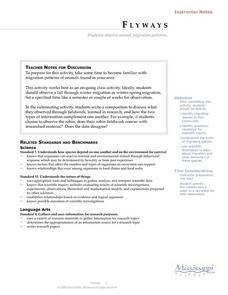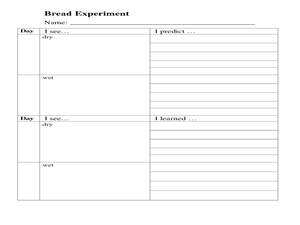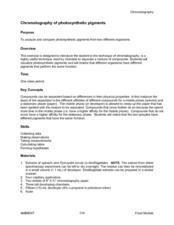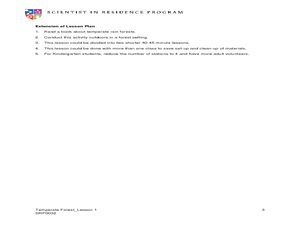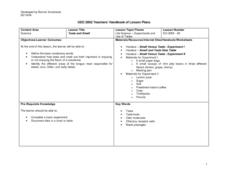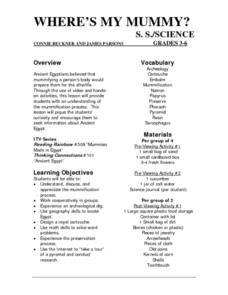Curated OER
Animal Migratory patterns
Students use field research and traditional research to identify migrating species of birds as well as their migratory patterns. Students generate a list of questions regarding migration and a plan to research the questions. A field...
Curated OER
Forest Decomposition
Students explore decomposition. Students define and describe components of the decomposition process. Students make a composter in a terrarium. Students record observations and changes weekly, drawing conclusions about the results...
Curated OER
Chromatography of photosynthetic pigments
Students explore the technique of chromatography to separate compounds in a mixture. In small groups, they separate by paper chromatography and identify the major and accessory photosynthetic pigments.....................................
Curated OER
Observation and Stimulation of bioluminescence and chemiluminescence
Students are introduced to chemical reactions, reaction rates, chemiluminescence, fluorescence and bioluminescence. They use glow sticks are used to demonstrate the effect of temperature on the rates of chemical reactions. Pupils recall...
Curated OER
Pumpkins By the Pound
Use pumpkins of various sizes to experiment with weight and perimeter. First the class lifts the pumpkins one by one, estimating each pumpkin's weight. They arrange the pumpkins from lightest to heaviest, and then string weigh each one...
Curated OER
Models as Tools for Ecosystem Management
Fifth graders explore the concept of environmental management. In this ecosystem lesson, 5th graders discover how models help scientists learn more about managing ecosystems. Students create their own model, make observations and...
Curated OER
Seed Socks
Students explore how seeds travel. In this seed disbursement lesson, students head outside in their bare socks. Students walk around then before going inside they take the socks off and examine what their socks picked up. As a class the...
Curated OER
Exploring Forest Objects
Students explore the forest. For this ecosystems lesson, students rotate through sensory activity centers, brainstorm, and read about temperate forests.
Curated OER
New Jersey Estuaries
Students experiment to discover that salt water is denser than fresh water by creating color coded solutions. They examine how heavy rainstorms and high tides develop layers of different degrees of density.
Curated OER
Outdoor Art
Students create art projects outside. In these outdoor art lesson plans, students use items in nature to enhance their creativity. They are encouraged to paint rocks, use fences for collages, weave sticks/feathers through picket fences,...
Curated OER
Taste and Smell
High schoolers experiment with sense of smell, and how it relates to sense of taste.
Curated OER
This is Cool!
Third and fourth graders who are studying states of matter will enjoy this simple exercise. In it, they look at a picture of a girl in her kitchen, and they must circle five examples of materials that have changed states of matter as...
Curated OER
Vincent VanDuca
Students create art with the Manduca by placing gel on their body and letting them walk over colored paper. They discover what their footprints and movements are like. They create a piece of art by using the Manduca markings.
Curated OER
The good microbes
The question posed for the class to consider; What would decay and what would not? They read the short passage on decomposition and microbes, then mark the items that would decay after a two-week period. A scientific investigation idea...
Curated OER
Plant Diversity and Distribution
Students construct a defined plot on school grounds and observed patterns in plant life. They count trees, shrubs, cacti and record on a data sheet. They compare data and generate a plant diversity overlook for their school.
Curated OER
In the Company of Wild Butterflies
Learners discover the life cycle of a butterfly and explain the different stages. In this exploratory lesson students watch a video and create insect art and they will get an opportunity to view live specimens of butterflies.
Curated OER
Living it up with plants
Have kids in grades K-2 discuss how they know a tree is alive. The worksheet provides simplistic background information and an observation check list. They check off the ways that they can tell an oak tree is a living thing. Note: The...
Curated OER
Germs and Your Body
Students study germs and ways your body fights against disease. In this germs lesson students complete an activity that demonstrates where germs can get into your body.
Curated OER
Biomanipulation
Students explore the effects of aquatic trophic relationships on water transparency. They observe and explain the effects of reducing nutrient inputs on agal density on water transparency.
Curated OER
I Wonder What Would Happen if Lots of Manduca Lived in a Small Place...
Students discuss the reasons why humans fight and look for similiarties in animals. They make predictions on what they think will happen when they observe insect crowding. They make conclusions about their predictions to end the lesson.
Curated OER
Where's My Mummy: Preservation Techniques
To observe preservation techniques firsthand, learners dry a flower in sand and compare cucumber slices soaked in salt water for a week with slices left out to dry in the open air. Video resources (not attached) include one about mummies...
Curated OER
Digestion Simulation
Middle schoolers study the human digestion system and the functions of the stomach and small intestines. For this digestion lesson students view a demonstration on the process.
Curated OER
Manduca
Students investigate the basic survival needs of both hornworms and humans. They compare and contrast the them by making a class list.
Curated OER
Artifacts 1: What Can We Learn From Artifacts?
Sixth graders are introduced to artifacts and explore an online archaeological site to connect clues about how people once lived. In this deductive reasoning lesson, 6th graders participate in the stratigraphy game on Kids Dig...


